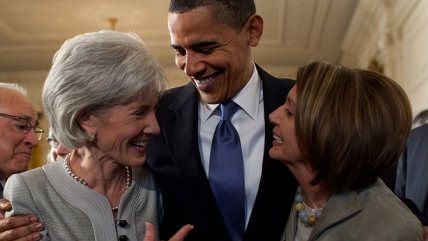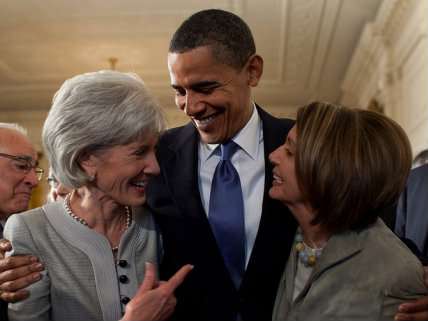Obamacare Survives
The health law keeps failing-but stays alive anyway.


A year ago, if you had talked to either critics or supporters of Obamacare, most would have predicted that by this time, the heated controversy over the law would be winding down, and the success or failure of the law would be more or less plain for all to see. Either it would be firmly entrenched in the nation's policy firmament, with millions of Americans about to happily enjoy new health coverage, or it would be on its way out, a longtime political loser finally getting the boot it has so long deserved. The controversy might not have disappeared entirely, but the verdict would be clear.
What neither side would have predicted was that the rollout would have gone so badly—and that the law would still be hanging on anyway, surviving, day by day and news cycle by news cycle, its political future and policy success as uncertain now as ever.
In broad strokes, the disastrous launch has vindicated the law's critics. Although few predicted all the specific problems the law would have, the rollout was, if anything, worse than most dared to imagine. Almost nothing has gone well for the health law in 2013, which was supposed to be the year that its biggest benefits were introduced to the public. The first nine months of the year were marked by a series of delays: key provisions of the small business exchange, income verification requirements, and the employer mandate were all postponed. Democratic legislators voiced their growing anxieties about the exchange implementation process behind closed doors at the White House, and occasionally in public as well.
The administration dismissed such concerns, but in the last three months of the year, the skeptics were proved right. In October, the online health insurance exchanges that were supposed to be central to the law's expanded coverage scheme didn't go live so much as show up dead on arrival: The federal exchange covering 36 states barely worked at all, and more than a third of the 15 states running their own exchanges had significant problems.
There was no question about it: The administration had failed—and they had failed despite scaling back the project's scope via multiple delays, and despite leaving some 30 to 40 percent of the project incomplete.
By December, the worst of the federal website problems had been corrected, leaving just a handful of state-run exchanges with serious technical troubles. But by then, huge damage had been done. By bungling the initial execution of an already unpopular law, the administration had confirmed the public's wariness about the law, and about the federal government's ability to deploy large-scale social projects in general.
Even with the most serious website glitches patched, another issue remained: Millions of Americans with individual health policies had received cancellation notices as a result of the law. Some still couldn't get through the website gauntlet to purchase new insurance. And many of those who could found that their new plan options were more expensive, and worse overall, than their previous plans.
The law was frustrating millions of ordinary people. It was also a political disaster, since President Obama had pitched the law on the promise that people who liked their existing health plans could keep them. In response, the administration resorted to series of deadline delays and administrative tweaks: allowing individual health plans to extend by a year with the permission of state regulators, delaying the final day to sign up for January coverage not once but twice, and exempting those with canceled individual policies from the individual mandate's penalty next year.
Those changes, often announced with timing that made it seem as if the administration was none too eager to draw attention to its decisions, added to the sense that the administration was navigating without a map or a compass. And they made the specific details of the law itself seem like afterthoughts, as if the legal niceties hardly mattered.
It was a total catastrophe—a mess on a personal, political, and policy level.
It's almost impressive how poorly the Obama administration managed the start of its signature achievement. What many envisioned as American liberalism's crowning modern achievement looked instead like something out of a Marx Brothers movie—a comedy of errors, with each glitch leading to another larger failure.
Equally impressive, however, is the law's staying power, at least so far. Liberal activists are weary, but still hopeful. Democrats in Congress are anxious and watchful, but only a few have started to defect. And the administration remains as firm in its defenses of the law as ever, even as the president's poll numbers sag, and long-soft support for the law grows softer still.
What Obamacare has proven this year is not that it can work, but that it can survive, not so much as a specific legislative initiative, but as a policy idea and a political vision. Whether it can do more than that will require another year, at least, to know for sure.
